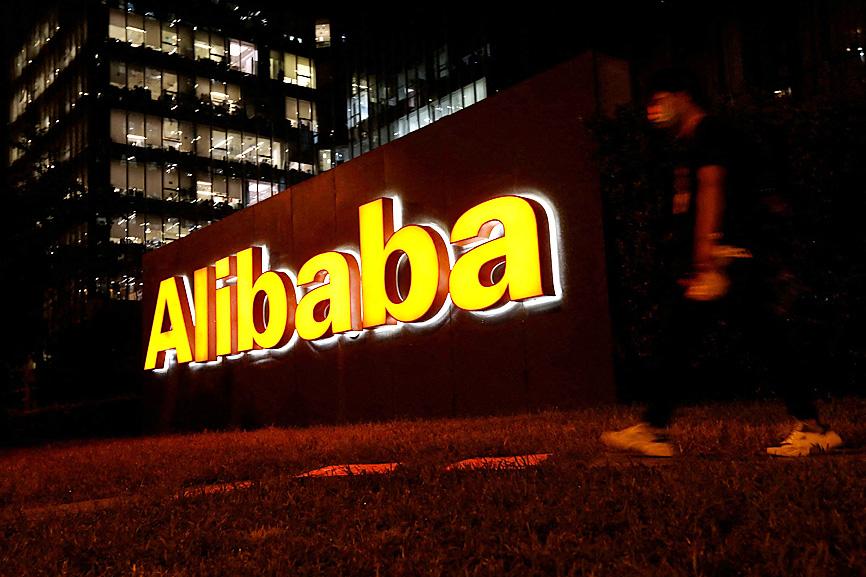E-commerce giant Alibaba Group Holding Ltd (阿里巴巴) yesterday said it would seek a primary listing in Hong Kong, potentially giving access to China’s vast pool of investors, as Chinese officials indicate a long-running crackdown on the tech sector could be coming to an end.
The move also comes as Chinese tech companies traded in New York grow increasingly worried about a regulatory drive by US authorities amid simmering tensions between the superpowers.
While Alibaba has a secondary listing in Hong Kong, that does not allow it to join a popular Stock Connect program that links to bourses in Shanghai and Shenzhen.

Photo: Reuters
The primary listing, which is expected to take place before the end of the year, would open that door.
News of the plan sent shares in Alibaba soaring more than 5 percent yesterday, boosting other tech firms and helping drag the broader Hang Seng Index higher.
Alibaba chief executive officer and group chairman Daniel Zhang (張勇) said the primary listing aimed to foster “a wider and more diversified investor base to share in Alibaba’s growth and future, especially from China and other markets in Asia.”
“Hong Kong is also the launch pad for Alibaba’s globalization strategy, and we are fully confident in China’s economy and future,” Zhang said.
Alibaba said it had an average daily trading volume of US$3.2 billion in the US in the first six months of the year, while its Hong Kong secondary listing saw about US$700 million.
Hong Kong’s Stock Connect program enables firms to take advantage of liquidity from China for easier financing and higher valuations, but to qualify they must conduct a majority of their annual trading in the Chinese finance hub.
Alibaba is among a category of “innovative” Chinese firms with weighted voting rights or variable interest entities that would be eligible for dual-primary listing in Hong Kong, following a rule change by the bourse in January.
The move would be “massive” for Alibaba, said Forsyth Barr Asia Ltd analyst Willer Chen (陳偉樂), adding that inclusion in Stock Connect could lead to a “more diversified investor base.”
Beijing has opposed an attempt by US regulators to inspect the audit papers of Chinese firms listed there, and Alibaba is among 250 companies that face potential removal if no deal is reached.
Domestically, Alibaba is still reeling from the tech crackdown as well as China’s slowing economy caused by the fallout from strict COVID-19 curbs.
The firm has lost about two-thirds of its value since a 2020 peak, Bloomberg said, and in May the firm reported that profit fell 59 percent in the past fiscal year.

‘SWASTICAR’: Tesla CEO Elon Musk’s close association with Donald Trump has prompted opponents to brand him a ‘Nazi’ and resulted in a dramatic drop in sales Demonstrators descended on Tesla Inc dealerships across the US, and in Europe and Canada on Saturday to protest company chief Elon Musk, who has amassed extraordinary power as a top adviser to US President Donald Trump. Waving signs with messages such as “Musk is stealing our money” and “Reclaim our country,” the protests largely took place peacefully following fiery episodes of vandalism on Tesla vehicles, dealerships and other facilities in recent weeks that US officials have denounced as terrorism. Hundreds rallied on Saturday outside the Tesla dealership in Manhattan. Some blasted Musk, the world’s richest man, while others demanded the shuttering of his

Taiwan’s official purchasing managers’ index (PMI) last month rose 0.2 percentage points to 54.2, in a second consecutive month of expansion, thanks to front-loading demand intended to avoid potential US tariff hikes, the Chung-Hua Institution for Economic Research (CIER, 中華經濟研究院) said yesterday. While short-term demand appeared robust, uncertainties rose due to US President Donald Trump’s unpredictable trade policy, CIER president Lien Hsien-ming (連賢明) told a news conference in Taipei. Taiwan’s economy this year would be characterized by high-level fluctuations and the volatility would be wilder than most expect, Lien said Demand for electronics, particularly semiconductors, continues to benefit from US technology giants’ effort

ADVERSARIES: The new list includes 11 entities in China and one in Taiwan, which is a local branch of Chinese cloud computing firm Inspur Group The US added dozens of entities to a trade blacklist on Tuesday, the US Department of Commerce said, in part to disrupt Beijing’s artificial intelligence (AI) and advanced computing capabilities. The action affects 80 entities from countries including China, the United Arab Emirates and Iran, with the commerce department citing their “activities contrary to US national security and foreign policy.” Those added to the “entity list” are restricted from obtaining US items and technologies without government authorization. “We will not allow adversaries to exploit American technology to bolster their own militaries and threaten American lives,” US Secretary of Commerce Howard Lutnick said. The entities

Minister of Finance Chuang Tsui-yun (莊翠雲) yesterday told lawmakers that she “would not speculate,” but a “response plan” has been prepared in case Taiwan is targeted by US President Donald Trump’s reciprocal tariffs, which are to be announced on Wednesday next week. The Trump administration, including US Secretary of the Treasury Scott Bessent, has said that much of the proposed reciprocal tariffs would focus on the 15 countries that have the highest trade surpluses with the US. Bessent has referred to those countries as the “dirty 15,” but has not named them. Last year, Taiwan’s US$73.9 billion trade surplus with the US